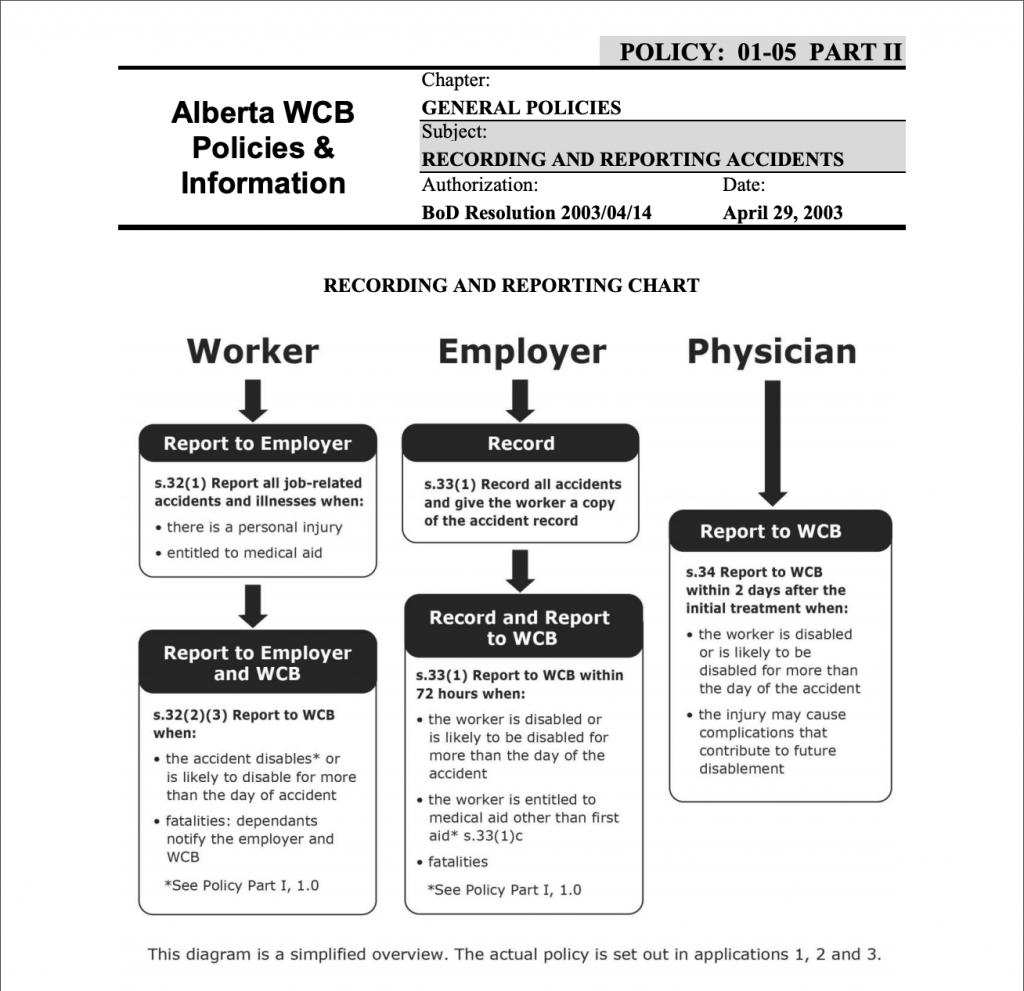When Should an Employer Report an Accident to the WCB?

As much as we try to avoid them, the reality is that accidents happen at work. Some are minor, some result in medical treatment, and unfortunately some result in serious injury or death. Most work-related accidents are obvious and reporting them to the Workers’ Compensation Board (WCB) makes sense. Yet some accidents or incidents seem so inconsequential that it does not make sense to spend the time, effort and expense to report them. So, in these situations, how does an employer decide whether or not to report an accident to the WCB?
Essentially there are 3 criteria an employer needs to consider when determining if a minor work injury needs to be reported to the WCB:
- First Aid versus Medical Aid
- Job duty modification
- Damage to personal medical aids and appliances
First Aid vs Medical Aid
In Alberta, WCB Policy 01-05, Part 1, Reporting and Recording Accidents addresses this issue directly.
The policy states that the recording and reporting of accidents is the joint responsibility of workers, employers, and physicians. Workers must report accidents/incidents to their employer, employers must keep a record of the accident, and employers must provide the injured worker with a copy of the record. It goes on to explain that workers, employers, and physicians must report an accident to the WCB if it disables or is likely to disable a worker beyond the date of the accident. It also says that an employer must notify the WCB if a worker is entitled to medical aid due to an accident. However, the Workers’ Compensation Act differentiates between “medical aid’ and “first aid”— this is where the subtlety lies.
First Aid is defined by the WCB as follows:
First aid is limited to a one-time treatment, with follow-up visit if needed, for observation purposes only, of injuries such as minor cuts, scrapes, scratches, treatment of minor burns, removing splinters, etc., or other minor injuries which do not require medical treatment beyond the date of accident. First aid is the type of treatment performed regardless of who performs the treatment.
In most cases, first aid treatment is provided by a first aid practitioner. However, there may be situations when the first aid treatment is provided by a physician or at a medical facility. These possibilities are more likely when:
- the hospital or health facility is the workplace
- the employer has on-site health care practitioners and health facilities
- the employer has specific contracts with health care facilities to provide first aid and health care to their workers
If the professional skills of a healthcare professional are required, and a first aid practitioner could not have provided the care and evaluation, the treatment is not first aid and should be reported to WCB.
Simply put, if a worker is injured on the job and can be treated by an average person with basic First Aid training and does not require any additional medical treatment, other than observation, then the accident does not need to be reported to the WCB.
For example:
A scrape on a worker’s finger from banging it against a worktable that requires First Aid assistance to put on a bandage does not need to be reported to the WCB. If the scrape heals without any issues, the WCB still does not need to be involved. However, should the scrape become infected in the days following the incident, and require antibiotic treatment, the accident now needs to be reported to the WCB.
There are exceptions to the First Aid guideline where even though no medical aid was required, a minor injury needs to be reported to the WCB.
Job Duty Modification:
Beyond medical issues, there are other complications that can impact whether a work-related accident should be reported or not. These are situations where there is a minor injury that does not require any further medical treatment but the injury has an impact on a worker’s ability to perform their regular job duties.
For instance:
A worker’s job duties include lifting heavy cases of product to put on shelves and while lifting a case they feel a pull in their lower back. They do not miss anytime from work, they do not seek medical attention so the incident does not need to be reported to the WCB. However, every time the worker tries to lift a similar case, they feel the same pull in their back. In order to prevent further injury, the worker’s employer modifies their job duties so they no longer need to lift cases. Once the job duties have been modified to accommodate the worker’s injury, the incident needs to be reported to the WCB.
Damage to Medical Appliances:
Just to complicate things a little, there are some situations where a worker has been involved in a work-related incident but there are no physical injuries, no medical treatment and no time loss from work but it still needs to be reported to the WCB. These are instances where there has been a work-related event or near-miss and a worker’s medical appliance (such as eyeglasses, dentures, hearing aids and prosthetic limbs, etc.) has been damaged and as a result requires repair or replacement. The cost of the repair or replacement is covered by WCB and therefore it must be reported.
To illustrate:
While in a warehouse, a pallet jack is accidentally pulled over a worker’s foot however, the worker has an artificial leg. The worker suffers no physical injury but upon leaving work and removing their footwear it is evident that the prosthetic foot has been damaged by the pallet jack and needs to be repaired. Because the cost of the repairs is an expense covered by the WCB, the incident must be reported.
Regardless of whether the injury needs to be reported to the WCB, the injured worker is required to report the incident to their employer and the employer is responsible to record the incident in the company safety log.
The importance of recording or documenting these accidents/incidents should not be underestimated; even the most minor of injuries can develop unexpected or unforeseen complications which may require reporting to the WCB in the future. Recording of minor events or near misses provides all the historical information necessary to accurately report the accident to the WCB and allows the WCB to manage the claim effectively, even if the reporting is after the date of the accident.
In reality, the vast majority of work-related injuries need to be reported to the WCB and the consequences of reporting an accident that didn’t need to be reported are minimal. In most cases, these become No Time Loss Claims with little or no costs and have no impact on an employer’s WCB premiums. On the other hand, the repercussions of not reporting an accident that should have been reported can be costly not only in claims costs but in WCB fines.
The bottom line is that if you think it is a WCB claim, it probably is, so report it and even if you think it’s not, make certain that the incident is fully documented in the company’s records.
For further advice or information on when to report a claim to the WCB, you can contact us directly, during business hours, using our chat feature or by phone at 1-844-377-9545, you can reach us by email at [email protected], [email protected], and you can always connect with us on Facebook ,Twitter, or LinkedIn.




